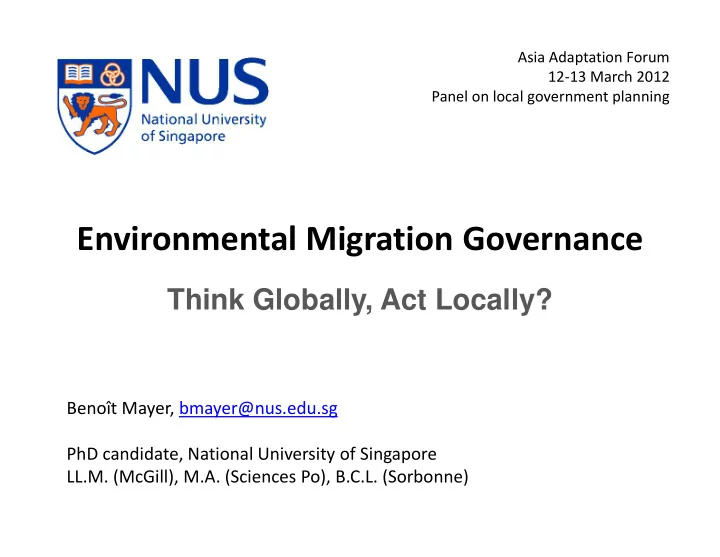

Asia Adaptation Forum 12-13 March 2012 Panel on local government planning Environmental Migration Governance Think Globally, Act Locally? Benoît Mayer, bmayer@nus.edu.sg PhD candidate, National University of Singapore LL.M. (McGill), M.A. (Sciences Po), B.C.L. (Sorbonne)
Five scenarios of environmental migration (Kälin, 2010) 1. Sudden-onset disasters 2. Slow-onset environmental degradation 3. ‘Sinking’ small island states 4. Areas designated by governments 5. Unrest, violence, conflicts Mostly internal (except scenario 3).
Existing or new laws? Existing laws ( lex lata ) Laws to be made ( lex ferenda ) - 1951 Convention Relating to the - Treaty / soft law? Status of Refugees - Transnational dialogue / cooperation? -Human rights, Guiding principles on internal displacement
Top-down International Responsibility? paradigm solidarity? Universal standards West Latin Pacific Asia Africa America Environmental migrations
By whom? Existing laws ( lex lata ) Laws to be made ( lex ferenda ) - 1951 Convention Relating to the - Treaty / soft law? Status of Refugees - Transnational dialogue / cooperation? -Human rights, Guiding principles on internal displacement
Research In 2008, 85% of people displaced by sudden disasters were Asians. Adapted from German Advisory Council on Global Change, 2008
Post-colonial International critique Responsibility? solidarity? “environmental refugees”, “Western” Universal standards institutions security approach Priority: preventing displacement Empirical research programs Lack of empirical data West Latin Pacific Asia Africa America Environmental migrations
Participative International paradigm Responsibility? solidarity? “environmental refugees”, “Western” Best practices institutions security approach Empirical research programs Lack of empirical data West Latin Pacific Asia Africa America Environmental migrations
Planning globally, acting locally • Plenty of lessons from past resettlement. – Tonga tribe relocated as part of the Kariba dam project: disbelief toward British colonists. (Howarth, The Shadow of the Dam , 1961) – Transmigration in Indonesia: role of the receiving communities. (e.g. Hugo, 2011) – Dhaka city: misdevelopment.
Conceiving multilayer decision-making Facilitates the debate: best practices, Transnational standards, etc. But lacks empirical basis. National Technical expertise, arbitrage. But lacks legitimacy. Local Reacts quickly to new situations; legitimacy. But lacks technical expertise. Individual Identifies and follows perceived opportunities. But lacks concern for the overall picture.
Challenges for Local Governments Decisions at the place of departure Decisions at the place of arrival - Allowing immigration: rational or - Adaptive strategy: staying or leaving emotional approaches. (or something in between). - Respecting immigrants: rights-based - (If need be), defining a migratory vs. economic approach. strategy: prohibition, restriction, authorization, encouragement, or compulsion; individual or collective; - Integrating immigrants: assimilation where to; when; what public support, or incorporation, or juxtaposition. etc. - Recognizing immigrants’ identity: - Who decides? Majority vs. minority collective representation, collective and individual rights. rights.
Thank you for your attention!
Recommend
More recommend